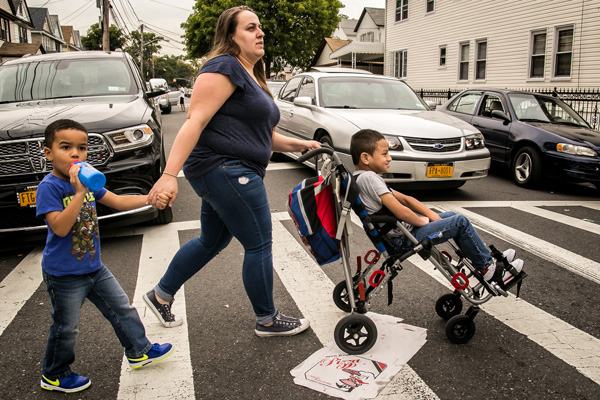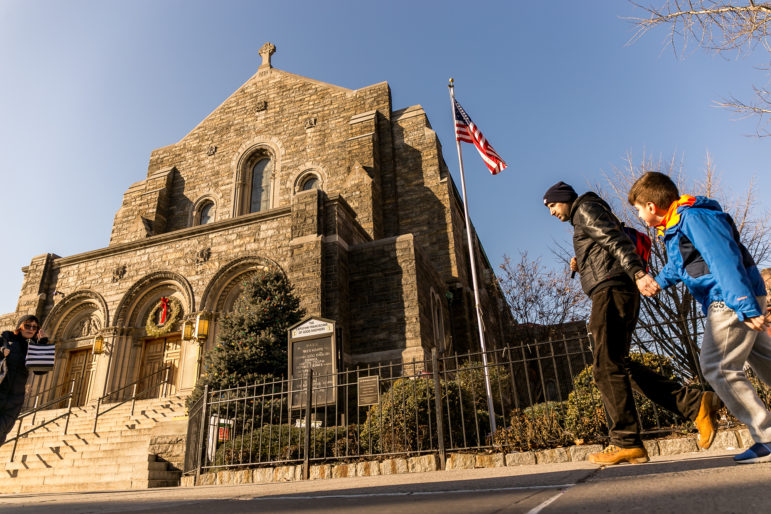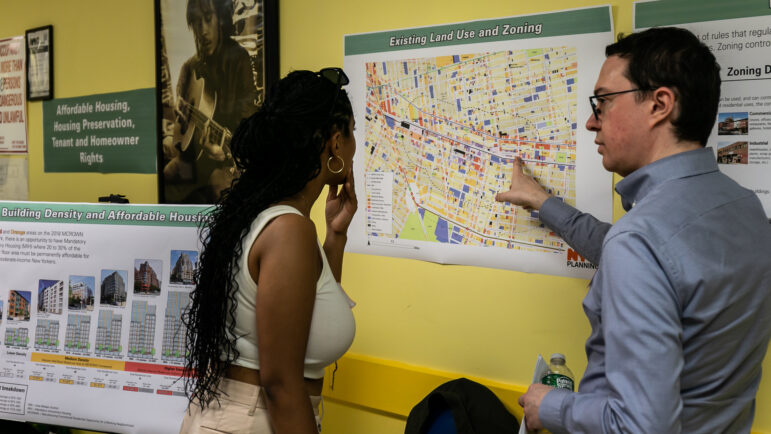
Photo by: Adi Talwar
Lorraine Doucette crossing the street with her sons Liam (4 years old, walking) and Jason (6 years old, in the chair) on their way to pick up her daughters from school, a few block away from their home. Lorraine struggled to get Jason’s public school to provide the services he needs.
For Lorraine Doucette, the final straw in dealing with the New York City Department of Education came in March of 2013, when her five-year-old son Jason was hospitalized with dehydration.
From the start of Jason’s Kindergarten year in 2012, there were problems at his Queens elementary school, namely that he didn’t receive services that were mandated for him under his individualized education plan (IEP)—a written document created for each public school child who is eligible for special education.
First, there was the issue of the missing classroom aide, whose absence kept Jason—who can’t walk on his own—out of school for the first two weeks of class. Then his occupational therapy was delayed. It took two more months for the school to agree to evaluate Jason, who can’t speak, for an electronic communication device, and then he was assigned one less sophisticated than the one he had the year before, when he was four years old and in pre-school.
But it was only after Jason was hospitalized with dehydration in late March, 2013, says Doucette, that she decided it was time to take action. Along with his neuro-genetic disorder, Jason cannot swallow food and has to drink all his meals. A month earlier she had learned that because his teacher felt Jason’s drinking from a bottle was “socially inappropriate” – the language she used with Doucette when confronted by her – Jason’s aide was bringing him to the nurse’s office so he could finish his meals in peace.
“That’s his hydration. That’s his nutrition,” says Doucette, the fury still in her voice. After her son was hospitalized, she filed a complaint against the DOE for failing to fulfill her son’s IEP. Two months later, she had a lawyer representing her pro bono.
It had taken Doucette months to discover what thousands of parents of school-age children learn every year—that navigating the maze of special education bureaucracy is a labyrinthine task, one not for the faint of heart. Whether it’s pressing to get your child placed in a private school or simply trying to get the services he has been assigned actually implemented, statistics and anecdotes indicate that parents without a lawyer at their side face almost impossible odds.
Most parents lawyer up
Under federal law first passed in 1973 and updated in 2004 through the Individuals with Educational Disabilities Improvement Act, all children with disabilities are guaranteed a “free and appropriate education.” They are not, however, necessarily entitled to an education that allows them to reach their best potential. And between what the law requires and what most parents want to see for their children lies a vast sea of dispute, confusion and downright rancor as parents and educators, lawyers and legislators struggle to parse what it means for a child with disabilities to be educated in the public school system today.
According to statistics by the DOE, more than 152,000 public school children like Jason entered the 2012-2013 school year with an individualized education plan; that number does not include children with IEPs who are in taxpayer-funded private schools. The plans ran the gamut, from allowing children with mild speech and/or motor delays to work alongside their peers in general education classrooms to plans calling for a spectrum of services so extensive that the child receiving them had to be educated either in the most restrictive classroom setting—with no more than five other peers in the class—or in the hospital. But the vast majority of the students were taught within community schools, in either general education or special education classes or in integrated settings—which combine general and special education students — with extra services.
And while only a small percentage of those students, about 4 percent, filed complaints with the DOE for failing to provide them with their mandated services, a review of a handful of the complaints reveals the hair-raising and heart-rending stories of parents who tried, and failed, to get the DOE to provide needed services for their children, until they hired a lawyer and won their suit.
According to statistics collected by the DOE and made public per federal law, in the 2012—2013 school year, a little more than 5,600 families filed complaints with the DOE, with requests ranging from additional tutoring to busing to private-school tuition reimbursement. Of the number of families who filed a complaint that year, 81 percent had an attorney or an advocate helping them shepherd their case through the DOE.
And while success rate statistics are difficult to determine—two separate departments within the DOE (the Impartial Hearing Office and the Office of Legal Services)—track and resolve the complaints—attorneys inside and outside the DOE acknowledge that families’ chances of success at winning concessions from the DOE are dramatically improved if they have a lawyer at the table.
For the past 16 years, Nelson Mar of Legal Services NYC Bronx has been working with low-income clients, helping them navigate an often-bewildering system as they push for better services for their children. For Mar, the fights can stretch from year to year, as schools drag their heels on implementing IEPs, promising to make changes and then not seeing them through or, most galling, rewriting an IEP and then sending parents back to the starting line of the complaint process if—the amended plan fails to satisfy the parent.
Over the years, says Mar, “I’ve had parents who have lost their jobs, couldn’t get a job or nearly lost a job” because they have spent so much time fighting the DOE. One of his most recent cases involved a single mother who was at risk of losing her job—and by extension, the family apartment—because of the amount of time she had to take off work to lobby for her elementary-school son, who has severe autism.
The boy had gone through pre-school with inadequate therapy and the same thing was happening again in Kindergarten. When the mother first contacted Legal Services in the Bronx, “I was concerned she would have a nervous breakdown because of the difficulties her son’s behaviors presented to her,” recalled Mar.
Funding structure creates problems
Part of the reason the services can’t address student needs is funding, say DOE employees. Schools receive more federal funding for placing students in the least restrictive classes than they do for specialized or the most restrictive classes—as part of the federal mandate that all children be educated in the least restrictive environment, if possible—so principals tend to put students in integrated classrooms, and then tack on additional services. Sometimes it works. Many times it doesn’t.
And because each school’s budget it set by October 31 of every year—the amount the school gets under what’s known as “fair student funding” (or FSF) is locked in, and principals are loathe to move students around after that.
And, every year parent advocacy groups and attorneys specializing in education law receive hundreds of phone calls from parents, with peak calls coming in October, to complain that their child’s IEP has not been appropriately implemented.
Lizabeth Pardo, an attorney at the Metropolitan Parent Center, an East Harlem-based parent advocacy group, estimated that she counsels (individually and through workshops) about 250 families a year on how to lobby the DOE for appropriate services for their child. Most of her clients are low-income and Spanish speaking, without a lot of experience navigating the DOE bureaucracy for their child. “So they need a lot of help,” stresses Pardo.
While most special-education students are served in a DOE school, thousands go every year to specialized private schools, with the DOE—under its legal obligation—paying tuition. Among low-income or non-English speaking parents who believe their child would most benefit from a private school, the family is almost always not equipped to see the fight through. The amount of paperwork needed can be staggering, say parents and advocates, and even if families win a precious seat, the DOE may try to reverse the decision.
That was the case for Adeliva Gabadian, a single mother living in a shelter in Brooklyn in 2006 when her then five-year-old son, Melijah, aged out of his private pre-school program and was placed in a District 75 special education school. For the next eight years, nearly all the progress Melijah had made in pre-school was undone. He fell on the stairs, cut his teeth, choked on his food. He came home repeatedly with bruises and scratches. With no adaptive therapy, he couldn’t eat food on his own. He forgot how to ride his bike. Time and again Gabadian told the school her son needed more help. But it never materialized. With the help of her son’s pediatrician and a social worker, she found an attorney and in August of 2013, filed a complaint against the DOE. This past June, a hearing officer ordered the DOE to pay for private school for Melijah. The DOE made a final effort to redress its wrong internally, offering Melijah multiple assistance if he returned to public school. “No way,” says Gabadian. “Over my dead body.”
City trying to improve the process
This is not to say that the DOE has been deaf to parents’ complaints. In the fall of 2013, the DOE opened the Impartial Hearing Representation Office to help streamline the complaint process, hear parents’ concerns and help improve the IEP writing and implementation process. Of the 5,600 complaints that are filed every year, roughly 1,000 go through the entire impartial hearing process. The majority of the complaints resolve in the parents’ favor. But the process can be drawn out, hearings can take months to schedule, and once a parent shows up with an attorney or advocate, the whole tenor of the conversation can change.
“There’s always a question, do you go to an IEP meeting with a parent?” says Laura Davis, an attorney with the New York Legal Assistance Group. On the plus side, an attorney can be a forceful advocate. “On the negative side, it absolutely changes the air in the room. People get their backs up, and we never know if they become more hard-line because we are there.”
In 2012, the DOE paid $12 million in salaries to staff attorneys to push back against parents’ requests for private school tuition. Attorneys for the DOE, who requested anonymity, say parents showing up with attorneys demanding more services than their children need are driving up costs for the DOE. Parents, in turn, argue that the DOE has made the special-education services delivery process so complex that they cannot navigate the bureaucracy effectively without them.
One attorney who works with the DOE and who asked not to be named is sympathetic to both arguments. There are clearly parents who are trying to game the system, says the attorney. “They request a lot of things that we can give them, and then request what we can’t give them [and] that allows them to go forward with the hearing.” At the same time, adds the attorney, the DOE has multiple problems of its own—it misses its own deadlines, drags out cases unconscionably and hasn’t adequately educated its own employees on how to write an appropriate IEP. “It’s ridiculous how many times [I have said], ‘No, that’s not accurate at all’ to the person creating the IEP or holding the IEP meeting.”
For Elisa Hyman, an education law attorney in private practice, it’s not so much a question of IEPs not being implemented, “It’s that there is a very limited menu of services. It’s a-few-sizes-fits-most strategy, while the law requires the services to be individualized.” To get a truly individualized IEP, maintains Hyman, “you have to sue the system.”
Message to a child: Hang on
That was ultimately the decision for another Queens family, which for four years struggled to get the DOE to pay for private schooling for their son. With an IQ of 78, in a class with 30 other students, held back in Kindergarten and then losing ground in first, second and third grade, his parents were losing hope. His first report card in third grade noted that he had scored a 1 out of a possible 4 in 20 of 21 learning areas.
“I kept asking for the smallest class setting,” remembered the mother, who describes her family as living “paycheck to paycheck” despite her husband’s college degree and her own two and a half years of college. Instead, she says, the school kept placing her son in an integrated class (where general education and special education students are combined) and giving him speech therapy and counseling in lieu of a smaller classroom.
It wasn’t working, and her son was well aware he was slipping behind. “Kids say things. You know how they are,” says his mother. “He’s in the fourth grade. He’s 10 years old. He’s five feet. You can’t keep holding him back. It’s not fair.”
Desperate, the parents paid to have their son evaluated privately and then asked New York Legal Assistance Group for help. They filed a complaint through the impartial hearing office and won an order for the DOE to pay for the boy’s transfer to a private school in Rockland County. Already, says his mother, her son has made demonstrable progress since the start of this school year.
“I kept telling him, ‘Hang on,'” she recalls. “‘We are going to get you out of there.'”








